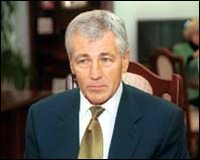These initiatives might seem surprising coming from a man who in 1997 cosponsored the Senate resolution that essentially called on President Clinton to reject the Kyoto Protocol on the grounds that it failed to include developing countries and posed barriers to economic growth in America.
But don’t assume that he’s a born-again greenie. Hagel insists that he hasn’t changed his views. He remains a staunch opponent of regulatory caps on greenhouse-gas emissions, arguing that the marketplace will evolve toward energy efficiency without government mandates. His bills are centered on industry incentives and voluntary public-private partnerships, strategies that most environmental activists consider too weak on their own to adequately address the growing climate crisis.
Hagel spoke with Grist from his Senate office in Washington, D.C., about the debate over what’s causing global warming, his opposition to mandatory emissions caps, and the divide in the Republican Party between those who do consider climate change an urgent concern and those who don’t.
Grist: Let’s start with the bills you introduced [last] month. What, if implemented, will they achieve?
Hagel: The objective is to address the issue of greenhouse-gas emissions in a realistic and achievable way. We hope to set into motion a series of public-private actions that would through technology development diminish significantly the emissions of carbon-based fuels and other greenhouse-gas emissions. The objective deals not only with the environment, but energy innovation and economic growth.
Grist: What are some examples of the public-private partnerships that would yield these substantial emission reductions?
Hagel: On the international bill, the focus is to get developing countries, which are becoming the greatest emitters of greenhouse gases, into a position where we can share technology with these countries that would leapfrog the old industrialized dirty-energy sources of economic growth — clean coal and diesel-use technologies and renewable-energy sources. You would create partnerships among innovating companies in the energy sector and partner those with programs sponsored by the governments of developing countries. You would remove the trade barriers and tariffs that currently restrict this kind of technology transfer.
Grist: And the domestic piece?
Hagel: Domestic public-private partnerships would be the same concept — you would take resources we have in government, such as the tremendous research efforts in the Department of Energy, and connect those with private-sector firms. You harness all the resources both public and private and accelerate innovations that could be applied across the board.
Grist: How do you rate your legislation’s chances of being passed into law?
Hagel: I’m hopeful. I’ve had many conversations with many colleagues on the committees involved — Sen. [Pete] Domenici [R-N.M.], chair of the Energy Committee, Sen. [Richard] Lugar [R-Ind.] of the Committee on Foreign Relations, and [Sen. Charles] Grassley [R-Iowa] in the Finance Committee. The response has been positive. I expect movement on at least getting hearings this year. I’m hopeful that we can get something passed — I don’t know if it’s this year, but certainly in this Congress.
Grist: You remarked recently in the Senate that the American people need to better understand how global climate change relates to our economic policies. Can you comment further on this connection?
Hagel: I don’t think you can separate environmental policy from economic policy or energy policy. They are circles of connection and they overlap each other. You can’t have economic growth without energy, and you can’t talk about the use of oil, coal, and natural gas without talking about environmental policy, because those carbon-based energy sources emit carbon, and that’s not good. The only way you can realistically deal with these issues is to come up with policy that integrates all three.
Grist: Is the idea also that the cleanest companies — those that innovate in the clean-technology sector and those that curb their pollution — will be the leaders of the 21st century global economy?
Hagel: That’s right.
Grist: Do you think the Bush administration is moving America toward this clean-energy horizon or has made any progress on climate change?
Hagel: Well, they’ve never really laid out a specific proposal or plan on this issue, as you know. I briefed the Bush administration, including the VP [Dick Cheney], [Chief of Staff] Andy Card, and Secretary [of State Colin] Powell, in late spring 2001 on this issue and strongly suggested that the admin lay out an alternative on Kyoto because it was important to our relationships around the world, our standing. But a few months later we had Sept. 11 and that really pushed climate change back into a secondary position.
Grist: What did you discuss when you met with Tony Blair in December on the climate issue?
Hagel: We had a good conversation. We addressed Kyoto somewhat and my intention was not to vilify or unravel Kyoto. What I was focused on was my program and plans and desire for America to reengage on the climate issue and show new leadership with meaningful plans. He was very enthusiastic and encouraged me to continue to do that.
Grist: While Blair supports mandatory caps, your proposal does not include them. Why?
Hagel: I have always believed that the marketplace does work. It works because it’s based on one fundamental dynamic, which is self-interest of an individual, a company, or a country. The marketplace fosters competition and always trends toward producing a better, cheaper product, which means it is a driver of efficiency. It’s in the interests of everyone here to make a cheaper product that’s less energy intensive. It cleans up the environment, which has economic advantages too, given the medical end-costs that nations incur when its citizens are afflicted with asthma and cancer and other health effects that come from pollution.
Grist: So you’re arguing that caps inhibit the marketplace? My understanding is that they can be an effective economic device used to accelerate the marketplace and encourage innovation and competition.
Hagel: Any time you put mandatory caps on any program — which I’m opposed to — you are going to have a consequence from that, and I don’t think it’s going to be a good consequence. You will lower productivity standards, you will lower efficiency standards, you will lower job choices, and you will lower the whole quality economic dynamic when you try and artificially cap energy use.
Grist: I have heard quite the opposite. Let’s take the example of the McCain-Lieberman Climate Stewardship Act, which would impose a market-based cap-and-trade program to accelerate innovation of clean technologies.
Hagel: That’s not good for the market. That’s not good or smart for anybody because that doesn’t let the marketplace work finding its own efficiencies. That’s why I’m always opposed to those kinds of remedies and I’m opposed to McCain-Lieberman.
Grist: But you would have polluters paying the innovators to develop ever cleaner and more efficient technologies — it would propel innovation.
Hagel: No, not at all. Because the people who will gain from that are people like nuclear power. Do you think nuclear power is more innovative than every other kind of electricity-producing source? What cap-and-trade does is it picks winners and losers. It has nothing to do with innovation. It throws off the natural market system that does work.
Grist: The cosponsors of your bills are largely Republican — did you intend to present this as a partisan initiative?
Hagel: It has to be bipartisan. Sen. [Robert] Byrd [D-W.V.] is one of the cosponsors of my international bill.
Grist: Why weren’t you able to get other Democrats to sponsor the bills?
Hagel: We’ve been working with a lot of Democrats. I’ll have other Democrats on all those bills, but I wanted to get [them] introduced. We’ll be getting more bipartisan support going forward.
Grist: Describe the arc of your thinking on climate change, from 1997, when you led the fight against Kyoto, to today, when you’re proposing a handful of bills to address the problem. Has your position on the climate problem changed?
Hagel: My position has been very consistent. In 1997, I introduced the Byrd-Hagel Resolution, and if you read that it says two things: the Senate would not ratify any climate-change treaty that does not include developing nations and does harm to the U.S. economy. So I’m right where I was in 1997 and that’s reflected in the legislation that I introduced. I’ve always said that climate change is a cycle of the world. We’ve always had extreme swings in climate, long before there was a combustion engine or a great population of human beings in the world.
Grist: I’m confused. Are you saying you don’t believe the current climate change is linked to human activity?
Hagel: We’ve known we’ve had an impact, absolutely, but exactly what impact human society has had on climate we’re not quite sure. But the real debate has always been, what action should you take? I’ve been very consistent on that point.
Grist: But the question of whether climate change is a human-made problem has been hotly contested by a number of Republican leaders on Capitol Hill. [In January,] we heard [Sen.] James Inhofe [R-Okla.] call climate change a giant “hoax” on the American people. Do you think this issue is creating a fault line in the Republican Party? Is it dividing your colleagues between those who do and don’t believe climate change presents an urgent challenge?
Hagel: No, I don’t think it’s a fault line dividing the party. We have some in the Republican Party and my colleagues in the Senate, like John McCain [Ariz.], Linc Chafee [N.H.], Olympia Snowe [Maine], probably five Republicans out of 55 that take a different approach to how we deal with it, but I don’t think it’s any kind of fracturing issue within the Republican Party. We’ve got a lot of issues within our Republican Party that there’s not cohesion on — take Social Security reform, tax reform, tax cuts, medical liability, take any big issue and you’ll find seven or eight Republicans who will have a different opinion than the majority. This is not one of those that’s a big dividing issue.
Grist: Is there more visible leadership on this issue in the Republican Party from colleagues such as Olympia Snowe, who just sponsored a report predicting that the point of no return on global warming could be as soon as a decade from now? Is there any kind of shift in the way your colleagues are thinking about the issue?
Hagel: Well, I’ve been in the Senate nine years and I haven’t changed my position. Sen. Snowe has been here around that long and I don’t think she has changed her position. I remember talking with McCain and Snowe about this years and years ago — they’ve always been in that position. Linc Chafee’s position is consistent with his dad’s [John Chafee, who held the same Senate seat previously]. I don’t think you’re seeing any fundamental shift in thinking about solutions and how you address climate change among my colleagues.
Grist: Have you made any changes in your own lifestyle to conserve energy and lessen your contribution to greenhouse gases?
Hagel: Well, I still drive a car. I still heat my home.
Grist: But there are now efficient technologies on the market — hybrid engine cars, efficient boilers, and so forth. Have you bought into any of these new innovations?
Hagel: I do think you see an improvement in technology in air conditioners, for example, or heating units or dishwashers. That technology is changing the way we live and making our daily lifestyles more energy-efficient and cheaper as well. And obviously that’s the marketplace working.




